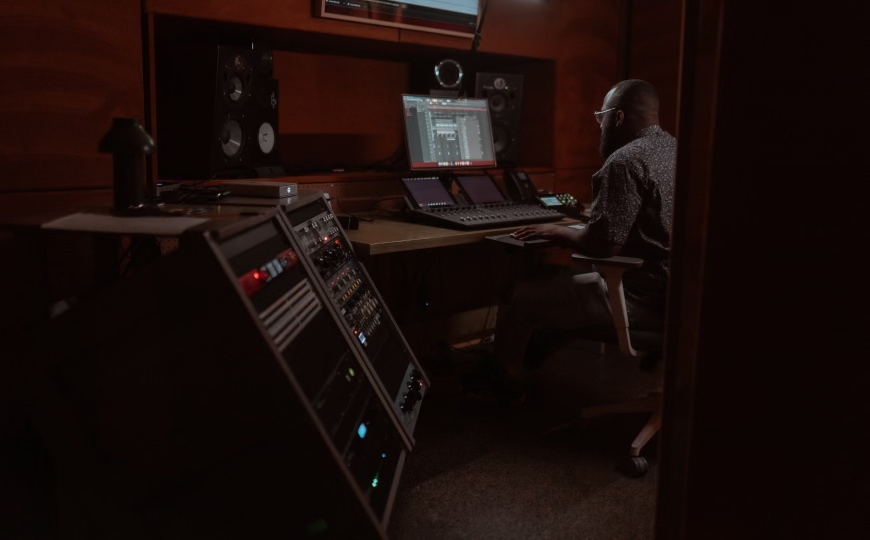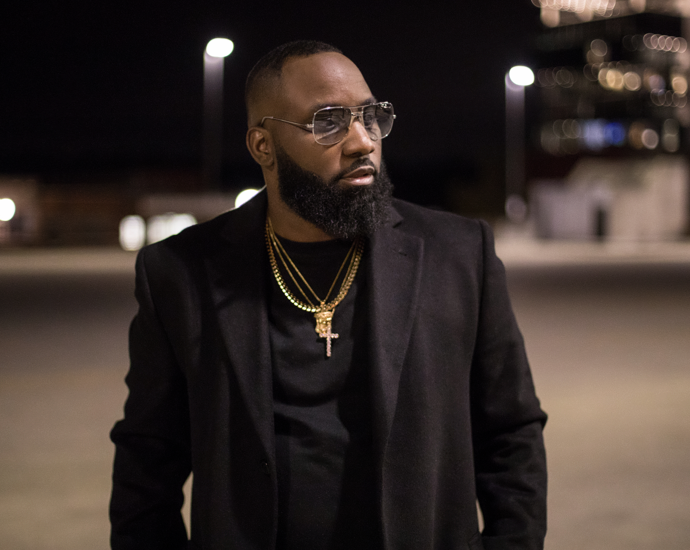Digging into the creative process, Byta speaks with artists, musicians, producers, DJs and anyone involved with music creation. A conversation about how they create, collaborate and share music. From studio setups to routines, and the first person to hear about the next 'big' work.
Where are you based?
I’m currently based out of Boston, MA but I’ve lived in Los Angeles, CA, Atlanta, GA and Moscow, Russia.
How, when and where did you start making music? Are you primarily a musician or a producer, or do something else?
I started playing the drums when I was a kid. That introduced me to music in such a unique way so I pursued music and attended a performing arts high school BAA (Boston Arts Academy). I learned music theory and production programs in addition to my major, instrumental. They taught us everything from timpani to marimba & Xylophone, Piano, percussion instruments etc… I was also able to use the facility at Berklee College of Music due to the partnership with my school. From there I was able to use different programs and learn production techniques from students who attended the college. In high school is also where I fell in love with rapping. We used to have freestyle battles in the cafeteria and that also sparked an interest in wanting to be an artist as well. That eventually led to me being an engineer out of the necessity of recording my own music to release it.
I play piano, drums, and guitar and produce, mix & master & compose music and lyrics for myself and other artists. I classify myself as a Multi-Genre One-Stop Producer/Mixing & Mastering Engineer-Composer – and Music Director. I focus on creating futuristic and experimental sound immersions to create a unique music experience for the listener. I have written and released music that fuses Pop, Rap/Hip-Hop, Drill, Trap, R&B, Rock, EDM, Afro Beats, and Latin genres that are inspired by my experiences gained from living around the world.
I also try to have multi-uses for my music. I may release it on my own as an artist, then I also use specific songs for pitches with my sync agent.
Here are a few examples of some sync usage of my catalogue that are also released as digital singles.
- ESPN Sunday NFL Countdown | Air Date: 9/13/20- “Rise”
- Bravo Real Housewives of Dubai | Air Date: 8/10/22 – “Go Down”
- MTV’s Teen Mom Young + Pregnant |Air Date: 8/2/22 – “Up 10”
- MTV’s Teen Mom Young + Pregnant |Air Date: 8/16/22 – “Undivided”
- Law & Order Organized Crime | Air Date: 9/21/21 – “Level Up”
- “Never Heard Movie “Soundtrack (Netflix) | 2018 – “Mama Prayed”
And here are a few of my production highlights:
- BIA & Ariana Grande – “Esta Noche” – (unreleased)
- BIA, Future – “Bobby Brown”
- Joyner Lucas – “Get Go”
- Joyner Lucas- Keep it 100
- N.O.R.E, Capone, Fat Joe, Jadakiss – “Still Getting’ It (The S.O.E reference in the track is International Show’s Recording Studio where the track was produced/recorded. Jadakiss & International Show promo clip
A new phase of my career that I have just entered is Production Education education. I recently became an Asst. Professor in the Contemporary Writing & Production Department at Berklee College of Music here in Boston, MA. This is exciting for me because I have been mentoring upcoming producers and volunteering with youth for many years at my studio to help them learn more about production and now I get to do it at a collegiate level and share, collaborate and have a greater impact. I am a member of the PMA (Production Music Association) and I have been a speaker on various production panels and conferences.
Who would you consider some of your biggest influences when it comes to your “sound”?
Some of my biggest influences are Timbaland for his way of thinking and innovative sounds. He has a distinctive sound and continues to adapt and grow. Just Blaze for his energy and sample ideas. His fusion of genres and different instrumentation always captured my ear. Jay-Z for his lyricism and wit when it comes to wordplay and entendres. His influence on the culture is something I would love to have one day Lord willing. Rick Ruben for his mixing and production and ability to adapt to different styles effortlessly. Jon Bellion for his creative genius when it comes to production and writing and arrangements. He’s an outside-the-box thinker and I can both appreciate and look up to that. Fun fact, I used to take beats that inspired me and try to remake them beat for beat note for note. Not to try to resell or release as my own work. I did that to try to understand the producers’ mindset and approach to his/her production and now here we are (lol).
Explain your creative process. Do you have a routine?
Whenever inspiration hits I make sure I seize it! It can go in many directions with me but my day MUST START OFF WITH PRAYER, MEDITATION AND READING! It is an absolute must. I feel like giving thanks for another day and being grateful for having the ability to create at any time is a blessing. After that, I check in on my son and then it’s off to the races. Sometimes it can come from a simple melody I randomly sing, or by something I heard.
What is your “studio” setup?
I have a home setup and I go into studio with my clients
Home setup:
- Apollo 8p (Interface)
- Neumann- TLM67 ( Microphone)
- LA2A – (Compressor)
- Heritage Audio ha73 – Pre amp
- Pair of Raven MTI2 – Monitors
- ProTools (DAW)
- MacBook Pro
- Computer Monitor
- AKai Mpk 61 (Keyboard)
Here is some of the studio equipment minimum requirements/favourites that I am specifically looking for (or the newer series/models of these) that ultimately determine if I will utilize that studio for a recording session:
- Focusrite Red16Line Thunderbolt, ProTools Ultimate, Ableton Suite 10, Logic ProX, PreSonus Studio One Professional (Interface/Computer/Peripherals)
- Hearback OCTO Mixers, Grace m905, Avantone CLA10 Active, Avantone Pro Active MixCube, Little Red Cue Boxes (Monitoring)
- Universal Audio LA-610, Focusrite ISA 428, Avalon (Mic Pre-Amplifiers)
- Empirical Labs Distressor, Warm Audio Bus Com EQP-WA (Outboard – EQ, Comp, FX)
- Neumann/Shure (Microphones)

What is your process when working with other people? How is collaboration different in the studio vs working remotely?
When I am producing for other artists I observe where they are in the process, and inquire and intuitively assess what direction they want to go in. I ask them questions like “What style or theme do you want to create, (cinematic, heavy bass, emotional, reflective)” based on that insight, it helps me know which type of sounds to begin with and evolve the sound.
Most of the time I prefer to start with recording the vocals only and then later match the music to it.
When I am collaborating with other artists as an artist (e.g. features or co-release) I am intentional about developing the cadence first, then I build out with ad-libs, and then I move into the lyric development based on the style of the song it was intended to be. I was taught that your vocals are like instruments in the song. So I always want to ensure that the vocals match the vibe of the other artist so it is truly cohesive.
When I work in the studio, it is easier to work and bounce ideas off each other more organically in real time because you get to feel the energy of the project come to life. I feel that some of that raw, authentic creative experience is lost with remote collaborations no matter if on video or sending things back and forth. I think they are less efficient in a sense and I found that it requires me to have more meetings, calls/texts, emails, and sessions for clear communication to get the project completed and ultimately creativity is essentially slowed in a sense. I noticed I get things done much quicker when I am in sessions in the studio and it offers better and deeper connectivity to the project because it is connected to a specific location, time, and environmental associations (lighting, scents, other session attendees, etc). When I work with my live band, it is always in person so we can truly feel what we are creating.
At what point(s) are you comfortable letting other people hear what you are working on?
I have a small group of people that I let hear the music first, but I won’t even share with them until the concept is clear and complete. And I use their feedback to go into more in-depth revisions/ edits then I am comfortable with a more broad release.
Do you share your work in progress (streams or downloads)? Any technical frustrations?
Yes, sometimes I turn projects I am working on, or trying to evolve into social media content to get a gauge for what people think and a few I noticed I let them “out of the gate” sooner than I thought I would be, based on that early feedback/responses. I don’t think I get technically frustrated, I tend to just dig into the issue and get hyper focused and I won’t stop working on it until I get it corrected.
How do you know when a track/album is finished?
When I have exhausted all insertion of creative options, and realize there is nothing more I can add to the track without diluting the initial concept, I know it is completed.
How do you listen to the final mixes/mastered work?
I listen to final mixes as a last check in different environments, on different audio systems and by using a variety of equipment/accessories ( in the car, wireless speakers at home, different headphone styles {earbuds, studio headphones, wired headphones}, etc.)
How important is pre-release security when sharing new work?
I currently use restricted links to single users, but I am working with my management team to migrate to some more secure platforms to retain more control over security.
Anything you are working on, anyone you are working with and want to share?
Building out more tracks in varying fused genres (Trap, K-Pop, Inspirational, Latin/Caribbean, Rock, Amapiano/Afro Beats) to continue to build out my production catalogue for multi-use ( artist releases, purchases, synch pitches)Continued sound exploration, more new releases, more production music and co-releases/collabs . A brand new initiative I started is T.R.I.M. ( The Route Into Music). Through this, I will begin pouring into others by teaching music production within the correctional facilities in the Boston area to introduce inmates and youth at detention facilities to a viable skill for their rehabilitation journey, and a therapeutic outlet. I have begun to moderate panels, and I am focused on doing more speaking engagements to advance the industry of production and composition.

